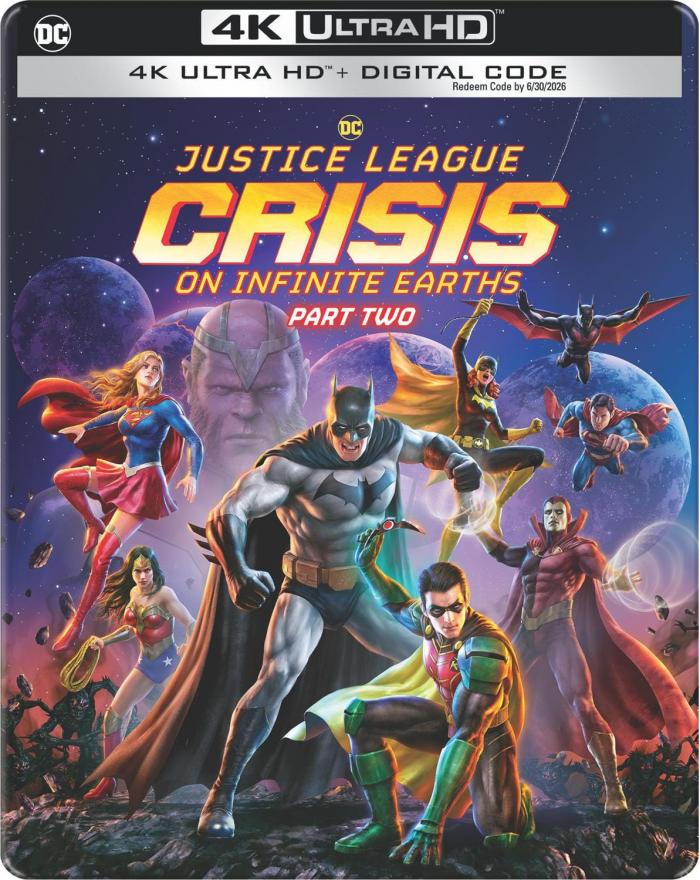A Crisis That Doesn't Matter: Part Two of DC's Animated Trilogy
FTC Statement: Reviewers are frequently provided by the publisher/production company with a copy of the material being reviewed.The opinions published are solely those of the respective reviewers and may not reflect the opinions of CriticalBlast.com or its management.
As an Amazon Associate, we earn from qualifying purchases. (This is a legal requirement, as apparently some sites advertise for Amazon for free. Yes, that's sarcasm.)

If you're a comics fan with a few decades of experience under your belt, you will be familiar with the event that forever changed the comic book industry -- DC's Crisis on Infinite Earths, a 12-part maxi-series with tendrils that touched nearly every title the company published at the time. Whether it was a good idea is something we debate with 20/20 hindsight, but at the time there was no denying that it was a big deal, and it had everybody excited about what was going on in the comic books every week.
There have been numerous attempts to recapture this kind of "lightning in a bottle." The CW network did their version, with the cast limited to the lineup of their handful of superhero shows in an epic crossover. Now DC is bringing to a close their direct-to-disc animated universe with their own version of COIE.
The missing ingredient in both of these attempts is history. Neither the CW nor the animated universe have that necessary foundation of several decades of stories, with hundreds of characters and thousands of issues. In short, there were (to the fans) "real world" stakes up with each chapter of the event. The character deaths had impact. The erasure of history had meaning. The outcome would alter the course of an industry for decades to come.
It's the same reason why other adaptations of classic stories don't work. When the animated version of "The Judas Contract" came out, it was watered down and went in a different direction, because the audience hadn't had the necessary build up to become invested in Terra as a character so that her ultimate betrayal and the revelation of her psychosis would make an impact. So DC is in a position where adapting the stories to their current universe don't have impact, and a true-to-source adaptation won't connect to their current audience who lack the background.
Thus, Crisis on Infinite Earths: Part Two is Crisis in name only, with the story of the seminal characters (The Flash, Supergirl, Psycho Pirate) being totally rewritten to service the new setting.
Before watching this movie, I sat down for Part One, which took us through the life of Barry Allen, The Flash. In this, we see that his entire life was him hopping around in time, knowing something was coming, being warned about the Crisis, and seeing it in action before being forced back to another segment of history. He was living his life out of sequence, but with memories of the events. It was maddening, but interesting, and it kept the viewer engaged through multiple connected adventures at one time, as we become introduced to The Monitor and Harbinger -- who, in this version of events, is also Supergirl.
Part Two picks up with the heroes guarding the specially erected towers that protect the remaining Earths from succumbing to the anti-matter waves that are destroying the multiverse. But in this chapter, the action scenes are few and far between as we are caught up in the sheer exposition of the major players. We get the full life story of this iteration of Psycho Pirate and his many incarnations on multiple Earths. We also get the hitherto unrevealed back story to Supergirl prior to her landing on Earth. And, of course, the Anti-Monitor himself, the driving intelligence behind the erasure of dimensions, is brought into the story in a new form. But the action is limited to the heroes fighting among themselves as they are influenced by the Psycho Pirate's enhanced ability to manipulate emotions.
I'll certainly be coming back for the third part of this story -- I'm committed enough for that. But altogether I feel I'd have rather watched all three in one sitting, rather than be left on the cliffhanger of a rather tedious middle chapter.


